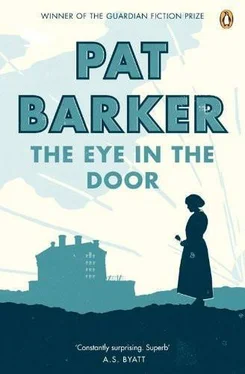The Ministry of Munitions was housed in the Hotel Metropole. The reception desk, now guarded by armed police, had once been manned by smooth-faced young men, trained not to look surprised when the sixth couple in succession turned out to be called Smith, or when prosperous-looking gentlemen, entertaining their curiously unprosperous-looking nephews, requested a double room. No such innocent frolics now, Prior thought, crossing the foyer. Goodness how the moral tone had declined.
On the third floor he tapped on Major Lode’s door. Lode looked up from the file he was reading, dabbing, as he always did when confronted by a new situation, at the outer corners of his large, silky, red-gold moustache. In defiance of biology, Prior saw this moustache as a feminine adornment: perhaps because it seemed to require so much protection from the outside world.
‘How did it go?’ Lode asked.
‘Quite well, I think. She was… fairly hostile to begin with, but I think towards the end she was starting to open up.’
‘Did you mention MacDowell?’
‘Only in passing. I thought it better not to… focus on him.’
‘Hmm, yes, quite right. So what’s the next step?’
‘I’d like to see Hettie Roper. The younger daughter. You remember she was walking out with MacDowell?’
Lode smiled. ‘Walking out? Yes. I was just thinking, what a quaint expression. But I thought that was over? That’s what she told the police.’
‘I don’t believe it. They were too close.’
‘Yes, well, do what you need to do. Good.’
And now, Prior thought, closing the door quietly behind him, you can fumigate your fucking office. ‘What a quaint expression.’ I could buy and sell you , he told the closed door. Lode had no idea . He’d spent his entire adult life — boyhood too, for that matter — in uniformed, disciplined, hierarchical institutions, and he simply couldn’t conceive of the possibility that other people might function differently. It was all a great big chessboard to him. This rag-bag collection of Quakers, socialists, anarchists, suffragettes, syndicalists, Seventh Day Adventists and God knows who else was merely an elaborate disguise, behind which lurked the real anti-war movement, a secret, disciplined, highly efficient organization dedicated to the overthrow of the state as surely and simply as Lode was dedicated to its preservation. And on the other side of the board, at the head of the opposing army, elusive, tenacious, dangerous: the Black King himself, Patrick MacDowell. It wasn’t complete nonsense, of course. Mac was certainly a more effective opponent of the war than most, if only because he was not in love with suffering. Poor Mac, he’d had enough of that by the time he was ten.
Prior walked down the corridor to his own room, tiny in comparison with Lode’s, hardly more than a cupboard. Evidently, in pre-war days this room had been reserved for those obliged to sin on a budget. He felt dirty, physically dirty, after the long train journey, and when he looked into the small glass above the washbasin he saw that his face was covered in smuts. He washed as much of himself as he could reach without undressing, and then began searching through the filing cabinet. He’d made a list of a number of files that contained reports from Lionel Spragge, and it took him only a few moments to gather them together and dump them on his desk. He had an hour to read through them before Spragge arrived. Spragge had been reluctant to come to the Ministry at all, suggesting they should meet outside, at some pub or other, but Prior had wanted this first meeting to be on his own ground.
He’d read the reports several times already, so it was merely a matter of refreshing his memory. When he came to Beattie’s file, to Spragge’s reports on the Roper affair and then to his deposition, he read more slowly. After a while he looked up, puzzled by the sense of something unfamiliar in the room. He stared round him, but could see nothing different, and then he realized that the change was in himself. He had not been angry until now.
LIONEL ARTHUR MORTIMER SPRAGGE
on his oath saith as follows:
2 February 1917. I am employed at the Ministry of Munitions. I entered the employ of the Ministry on 1 July 1916. I have been engaged making certain inquiries concerning various organizations amongst others the Independent Labour Party and the No Conscription fellowship. I reported to Major Lode. He was the officer from whom I chiefly got my directions.
Between October and December 1916 I was sent to Liverpool to make inquiries concerning one Patrick MacDowell. He had been the leading organizer of the Sheffield strike in the Munitions factories. I told MacDowell I wanted to go to the Manchester area. MacDowell gave me a letter to give to Mrs Beatrice Roper. On the night of I think the 23 rd December I went to Mrs Roper’s shop, at 11 Tite Street, Salford, and gave her the letter. After reading the letter Mrs Roper agreed that I could stay with her and we shook hands very heartily indeed. She sat at one end of the table, and I sat next to her. There was another man staying in the house at the time who was introduced to me as Tommy Blenkinsop, a deserter. He did not come downstairs until later. Mrs Roper asked me about myself. I told her I had been refused exemption and that I had been on the run since September as a moral objector. I told her about being locked up in a detention centre and I think I told her something of the treatment I had received there. At that she said, ‘That is just like my William,’ and she got up and fetched a photograph from the dresser. It was a small photograph of her son, William Roper. As she was showing me the photograph she told me that before the war she had been active in the suffragettes and that she had burnt down a church. I think her exact words were, ‘You know about St Michael’s? We were nearly copped, but we bloody well did it.’ She laughed and said, ‘You should have seen the flames go up.’ She then said, ‘And that was not all we did.’ She told me she had been party to a plan to kill Mr Lloyd George, by inserting a curare-tipped nail through the sole of his boot in such a way that it would pierce the skin when he put his weight on the foot, causing instant lassitude followed by seizures. They had been planning to do this on the Isle of Wight where Mr Lloyd George was staying at that time. There was a waiter in his hotel sympathetic to the suffragette cause. I do not recollect the name of the hotel, or of the waiter. I asked her why the attempt had not succeeded. She replied, ‘The bloody, shitting, buggering old sod pissed off to France, didn’t he?’ Mrs Roper’s language was fairly good most of the time but when she spoke of Mr Lloyd George she used bad language. I then made diligent inquiries as to the nature of Mrs Roper’s attitude to Mr Lloyd George. She several times expressed the opinion that he ought to be killed. I then asked her whether there was anybody else who ought to be killed and she replied, ‘Yes, the other George, that poncing old git in the Palace, he’d not be missed.’
I then asked her whether this was all talk or whether some plan was afoot. She replied, ‘Can I trust you?’ I think I said something to the effect that she was in a pretty pickle if she could not. She then said that she knew where to get curare and that Walton Heath Golf-course would be a good place to get Mr Lloyd George with an air-gun. She said she knew three good lads in London who would do the job. She then asked me if I wanted to be in on it and I considered it my duty to reply in the affirmative in order to procure further information. 1 passed that night at Mrs Roper’s house, and the following morning I reported back to Major Lode’s department in code.
Spragge was a big, fleshy, floridly handsome man, with thick brows and startling blue-green eyes that slanted down at the outer corners. His neck and jowls had thickened, and rose from his broad shoulders in a single column. Hair sprouted from his ears, his nostrils, the cuffs of his shirt. He was as unmistakably and crudely potent as a goat. Beattie would have gone for him, Prior thought, as he stood up to shake hands. He wondered how he knew that, and why he should mind as much as he did.
Читать дальше












